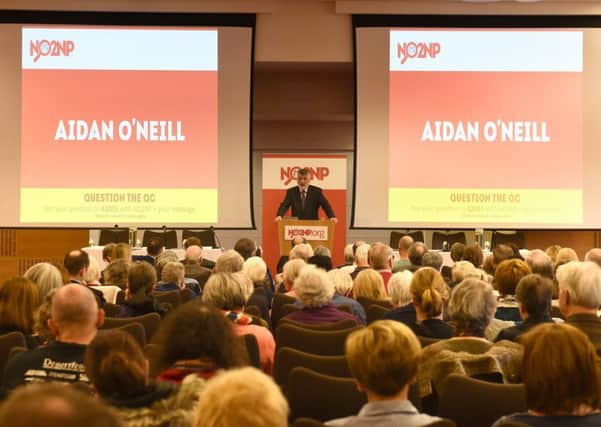Scott Macnab: Battle over Named Person scheme re-opens


The tragic death of the death of toddler Liam Fee at the hands of his violent, abusive parents three years ago horrified Scotland. The blame for this sickening crime lay squarely on the shoulders of his parents, Rachel and Nyomi Fee who subjected the youngster to a catalogue of violent abuse, along with other children in their care, and are now serving lengthy prison sentences. It once again sparked a fierce public outcry about failings in the care system after it emerged social workers were aware of concerns about the family and didn’t act.
But the debate in Fife, where the family lived, took on a different dimension as it was one of the areas where the Scottish Government had in place the template of its controversial Named Person proposal which it soon plans to have another go at rolling out across the country. Opponents of the proposals, which were dubbed state guardians and snoopers, seized on this as evidence of its shortcomings.
Advertisement
Hide AdAdvertisement
Hide AdFor others, it again showed the need for robust systems to ensure that public services are connected and working effectively together. Perhaps the Scottish Government’s plans would go some way to addressing this. In fact the Fee case was an example where the Named Person - in this case the youngster’s nursery teachers - appeared to work in practice by alerting social services to concerns they had identified with the family. It was only after this he appeared to “fall off the radar”.
The tragedy again showed how the balance between protecting the welfare of children and respecting the boundaries of parental autonomy remains among the most difficult dilemmas which governments face. Here in Scotland that onerous burden rests on the shoulders of Deputy First Minister John Swinney. He has pledged that the Named Person plan will still be re-introduced, in modified form, after campaigners scored a legal victory over SNP ministers last year. The UK Supreme Court ruled that the widespread sharing of personal information about youngsters between the NHS, schools and social work departments in the plans simply went too far.
But another battle is looming for the Deputy First Minister with the campaign group No To Named Persons (NO2NP), which spearheaded the legal challenge, attracting about 250 delegates to an Edinburgh conference this week pledging they will fight any fresh attempt to bring back the plans. Angered by Mr Swinney’s confrontational approach to the issue and being unfairly branded as “extremists”, they insist a wider issue about growing state encroachment into family life is at the heart of this debate.
The shift away from protecting children’s “welfare” to instead safeguarding their “well-being” has been major source of contention for campaigners. This new definition has been branded a “therapeutic category” which focuses more on managing parents’ “emotions and relationships” with their children. It’s the kind of vague, nebulous language which, at best, has prompted widespread misunderstandings of the issues involved.
At worst, it has created a significant new and lower threshold for interference in family life which is no longer significant harm - it’s anything that might affect a child’s well-being in the opinion of just about any person employed in services. And it means getting in while kids are young. The importance of a child’s development in the first two years of life has been demonstrated in countless global studies. In Scotland, this has prompted an “early intervention” approach being embedded at the heart of social support services in Scotland.
“It means intervening before there’s a serious problem,” the sociologist Dr Stuart Waiton told delegates at the conference this week. Historically it was always a recognised political gamble to encroach into family life because of the nature of the privacy, the autonomy and authority that a parent needs within that framework. Now there appears a diminishing sense within government that professional intervention in the family might be problematic. Perhaps the most stinging criticism of the Scottish Government’s approach came from the pro-independence campaigner and social work guru Maggie Mellon. The new approach made parents and families accountable to services, she said, it didn’t make services accountable to parents.
“Families are the safest and best way we know the human race has come up with to bring children up in,” she said.
And now it’s not just social workers who are in the firing line if anything goes wrong, with teachers and health visitors tasked with taking on the role of the Named Person under the Scottish Government plans.
Advertisement
Hide AdAdvertisement
Hide AdIt’s not even clear to what extent they will be able to access the supports envisaged. Attendance officers, home links teachers, behaviour and education support and other supports in communities for children are reducing as austerity continues to bite. This comes at a time when the social work profession faces growing hostility from on doorsteps, with a sense that every family coming into contact with social work for help is assessed on whether they present a child protection issue.
Ms Mellon says the new approach means “all parents are suspects and individual surveillance of families is the means of ensuring child safety”.
Named Person has only served to entrench this lack of trust between parents and professionals. Mr Swinney insists teachers and health visitors aren’t being asked to do anything they don’t already do, acting as a point of contact for youngsters to seek a range of services. This is a support role, not so much about child protection.
Mr Swinney knows there is an obligation on his part to build public confidence in the policy, but seems to have dismissed opponents, with their “negative messages”, as a lost cause.
“I do not engage in conversations about consultation with people who want to ensure that we do not have a named person policy,” he told MSPs recently. His pugnacious approach to opponents on this issue appears to make another divisive battle inevitable.